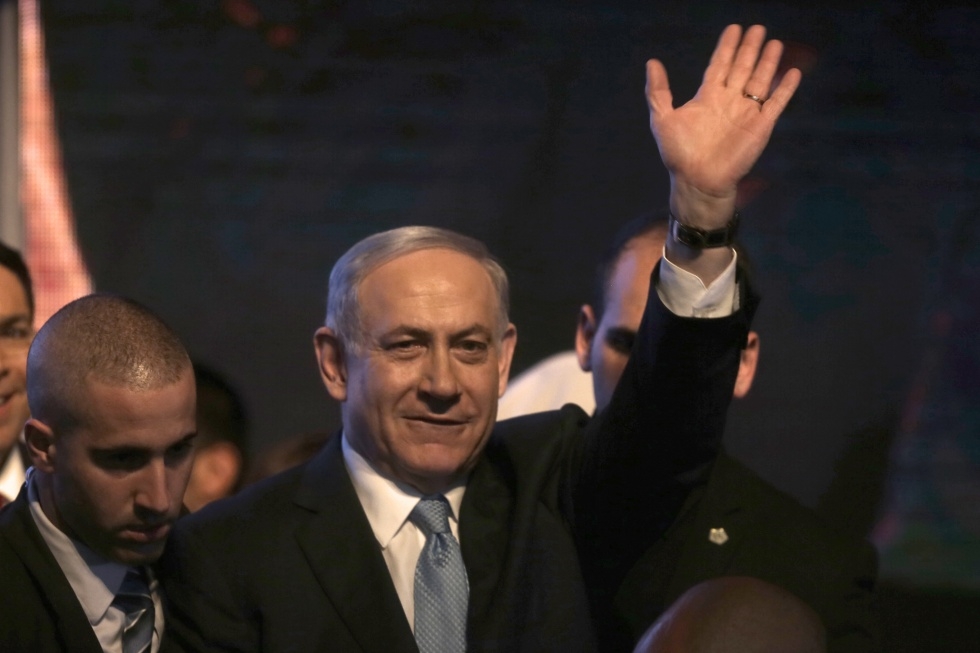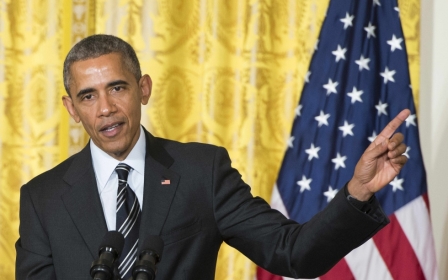Netanyahu's bitter fruits of victory

Benjamin Netanyahu could not have expected better results than those had in the general elections held last week in Israel. Thirty seats for his Likud party, six more than predicted in the best opinion polls in the weeks before election time, and a six seats' lead on the Zionist Union, behind which he trailed all through the campaign. Less than a week after the closing of the polls, President Reuven Rivlin appointed him to form his forth government with the support of 67 Knesset members. A dream come true.
Yet during his meeting with Rivlin, Netanyahu seemed worried. Not only because Rivlin openly scolded him for his remarks against the Arab voters by saying that "he who is afraid of ballots, will end by getting stoned in the streets". The personal relations between the two Likud leaders are known to be strained. But Netanyahu understands that despite his clear victory, forming a stable government may prove a much more difficult task than expected.
The simplest task, allegedly, is appointing a finance minister. During the election campaign, Netanyahu promised to give this prestigious post to Moshe Kahlon, a veteran Likud leader who ran independently after accusing Netanyahu and the Likud of neglecting the weaker layers in Israeli society. In their meeting early last week, Netanyahu fulfilled his promise and offered Kahlon the post.
But it is not over yet. Kahlon wants his party, Kulanu, to head the influential finance committee in the Knesset. Netanyahu is reluctant to give his consent. Above all because its seems he had already promised this post to one of the Orthodox parties. More, by giving away the chairmanship of the committee to Kulanu, he will hand virtually all control over his economic policy over to a party with only ten seats. In response, Kahlon suspended the coalition talks. It is excepted that they will resume shortly, but a possible headache is looming.
Things seem even more complicated with Netanyahu's most "natural" ally, the Jewish Home of Naftali Bennett. When elections were announced four months ago, it was predicted that Bennett would significantly increase his power above the twelve seats he had in the outgoing parliament. His war-mongering positions during Operation Defensive Edge were supposed to give him popularity and he did not hide his ambitions to surpass Netanyahu and become the biggest party in the right-wing camp.
But when the votes were counted, it turned out that the Jewish Home descended from twelve to eight seats. Bennett claimed that his supporters, many representing the settler community, "sacrificed" themselves by voting for Likud in order to save the country from falling into the hands of the Left, but Netanyahu does not seem convinced.
During the election campaign, Bennett set himself on replacing current Defence Minister, Moshe Yaalon, whom he accused of "softness" towards Hamas in the summer war in Gaza. Netanyahu will almost surely refuse as Yaalon proved to be his most loyal supporter within the Likud, and because Netanyahu himself would hate to change the status quo vis-à-vis the Palestinians while Bennett appears trigger-happy.
If not defence minister, Bennett insists on getting the foreign office, relying on a presumed promise by Netanyahu to receive at least one of the three leading ministries (finance, defence or foreign affairs). This is also unlikely.
While Netanyahu - under direct American pressure - zig-zags between his remark during the campaign according to which a Palestinian state will not be formed during his tenure in office and the interviews he gave the day after elections in which he vowed his commitment to the two-state solution, but claimed that only "circumstances" prevent its realisation - the last thing he needs is to give the foreign ministry to Bennett, who openly supports the annexation of parts of the West Bank and swears to prevent the creation of a Palestinian state.
A similar problem arose with current Foreign Minister Avigdor Lieberman. Lieberman, an ex-aid of Netanyahu who now does not hide his contempt for the prime minister, also targeted the defence ministry during election time. During the course of Operation Protective Edge, he criticised Netanyahu's policy and demanded that the Israeli army crush Hamas. Lieberman claimed he would do just that once given the responsibility.
As with Bennett, it is unlikely that Netanyhu will deposit this ministry into the hands of a man who seeks a new confrontation with Hamas. But if Netanyahu does decide to downgrade Lieberman and deprive him of the foreign ministry, he might find in him a fierce enemy, ready to stay out of the coalition. In such a case, Netanyahu will still have a majority of 61 out of 120 parliament seats, but it will be extremely vulnerable.
Netanyahu may have problems within his own party, as all key ministries - foreign affairs, finance, interior and education with the exception of defence – will probably be given to his coalition allies, despite the fact that the Likud increased his power from twenty to thirty seats. But these seem minor problems as no Likud politician seriously challenges Netanyahu's leadership at the moment. Yet some internal opposition is expected.
Despite all difficulties, if Netanyahu decides to go for a coalition with his right-wing partners, he will have a government before too long. But here comes a big "if". In all his three previous administrations, Netanyahu chose to incorporate more centrist or left-wing elements in his governments, whether it was the centrist Shinui party in 1996, the Labor party in 2009 or Tzipi Livni's Tenua'a party and Yair Lapid's Yesh Atid in 2013.
Now, when Netanyahu feels the heat coming directly upon him from the White House in Washington, he needs a moderate-looking coalition more than ever. While being more centrist, Kahlon will not help Netanyahu in fending off international pressure, as he is a completely unknown on the diplomatic level.
Even if Netanyahu manages to prevent Bennett and Lieberman from getting the foreign and defence ministries, he will still find it difficult to deal with US President Barack Obama's apparent insistence on promoting a Palestinian state within the framework of a right-wing coalition.
It is quite clear that Netanyahu understands that only the Zionist Union with Isaac Hertzog and Tzipi Livni could help him present to the world a more mild picture of Israel and prevent, or at least postpone, its growing isolation in the international arena.
But getting them on board might prove very difficult. Netanyahu himself repeated again and again during the election campaign that a huge ideological gap separates them as both Hertzog and Livni would quickly surrender to the Palestinians. Hertzog, for his part, seems to understand that joining Netanyahu's government would amount to political suicide, as most Labor parliament members will vehemently oppose it.
But miracles – or disasters depending on your point of view – do happen in Israeli politics. An extremely generous offer for the Zionist Union - for example, foreign and finance ministries in addition to a commitment to resume negotiations with the Palestinians - might convince the Zionist Union to jump into the unknown. Rumors that such a deal is on the way infiltrate the Israeli press. Bennett seems convinced that Netanyahu has already made his choice in favour of a coalition with the Zionist Union.
Another possibility is to tempt one of the Zionist Union's leaders to join the government on a personal basis. Menachem Begin, the first prime minister from Likud elected in 1977, appointed Moshe Dayan, one the most prominent leaders of Labor at the time, as foreign minister, thus giving his government the required international legitimacy.
Ten days after election, it is too early to tell what shape will the fourth Netanyahu government will take. But it is fair to say the easier solution, meaning the formation of a right-wing coalition with his "natural" allies, might prove the riskier one. To the point where it seems that with a narrower victory, Netanyahu's life might have been easier.
- Meron Rapoport is an Israeli journalist and writer, winner of the Napoli International Prize for Journalism for a inquiry about the stealing of olive trees from their Palestinian owners. He is ex-head of the News Department in Haaertz, and now an independent journalist.
The views expressed in this article belong to the author and do not necessarily reflect the editorial policy of Middle East Eye.
Photo: Feeling the heat from Washington, Netanyahu needs a moderate-looking coalition now more than ever (AFP)
New MEE newsletter: Jerusalem Dispatch
Sign up to get the latest insights and analysis on Israel-Palestine, alongside Turkey Unpacked and other MEE newsletters
Middle East Eye delivers independent and unrivalled coverage and analysis of the Middle East, North Africa and beyond. To learn more about republishing this content and the associated fees, please fill out this form. More about MEE can be found here.





